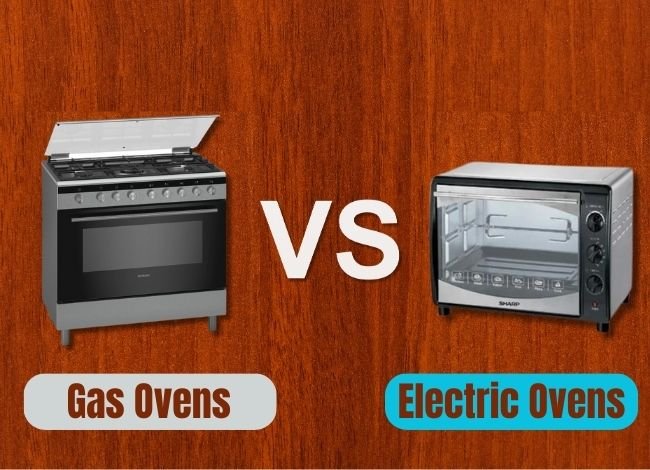Last Updated on February 9, 2024
When it comes to choosing the right oven for your kitchen, the debate between gas and electric models is a longstanding one. Both types have their loyalists, and each offers distinct advantages and potential drawbacks. Understanding the differences between gas and electric ovens can help you decide what best suits your cooking preferences, kitchen setup, and energy efficiency goals. This article aims to shed light on the key features, benefits, and considerations of both gas and electric ovens, providing you with the necessary information to make an informed choice.
What is a Gas Oven?
A gas oven operates on natural gas or propane, which fuels the heating element and cooks the food. These ovens are favored for their quick heating times and the ability to provide a moist cooking environment, which can be beneficial for baking bread and roasting meats. Gas ovens offer precise heat control, as the flame can be adjusted instantly to change the temperature, making them a preferred choice for chefs and cooking enthusiasts who demand accuracy in their cooking.
Gas ovens are typically more cost-effective to operate, depending on local gas prices compared to electricity rates. They are also known for their durability and can continue to operate during power outages, provided the ignition system does not require electricity. However, they may require more frequent cleaning to maintain optimal performance and ensure safety. Additionally, proper ventilation is crucial when using a gas oven to prevent the buildup of harmful gases.
What is an Electric Oven?
Electric ovens are powered by electricity and heat food through electric coils. They are renowned for their even heat distribution, which results in uniform cooking and baking. Electric ovens are an excellent choice for baking cakes, cookies, and other delicate items that require consistency. Moreover, electric ovens often come with various advanced features, such as programmable settings, convection options, and self-cleaning cycles, enhancing convenience and versatility in the kitchen.
Electric ovens may have a higher initial cost and can be more expensive to operate than gas ovens, depending on electricity rates. However, they are generally considered safer, as there’s no risk of gas leaks, and they do not require external venting. An electric oven’s smooth, flat surface is also easier to clean and maintain. Additionally, electric ovens offer a sleek and modern look, fitting well into contemporary kitchen designs.
Comparison Feature Table Gas Oven and Electric Oven
| Feature | Gas Oven | Electric Oven |
|---|---|---|
| Initial Cost | Generally lower than electric ovens | Usually higher due to advanced features |
| Operating Cost | Lower in areas with inexpensive gas | Higher, especially in regions with high electricity rates |
| Heat Distribution | Less even, creating hot spots | More even, ideal for baking and roasting |
| Temperature Control | Rapid response to temperature changes | Slower response, but precise temperature control |
| Installation | Requires a gas line, limiting placement options | Easy to install in any kitchen setup |
| Cooking Quality | Excellent for broiling and water-based cooking | Superior for baking due to even heat distribution |
| Energy Efficiency | Less efficient due to energy lost in exhaust | More efficient as energy directly heats food |
| Maintenance & Cleaning | More challenging due to grates and burners | Easier to clean, especially models with self-cleaning features |
| Environmental Impact | Emits combustion byproducts | Cleaner, especially if powered by renewable energy |
| Safety | Risk of gas leaks | No combustion, safer in terms of toxic emissions |
Gas Oven Pros and Cons
Pros:
- Immediate Heat Adjustment: Gas ovens offer instant control over heat levels, making it easier to adjust cooking temperatures on the fly. This immediate response can be particularly beneficial for dishes that require precise temperature control.
- Cooking Quality: Many chefs and home cooks prefer gas ovens for their ability to produce a moist cooking environment. This is especially advantageous when baking bread or roasting meat, as it can help keep food from drying out.
- Lower Operating Cost: Depending on your local utility rates, gas ovens can be cheaper to operate than electric ones. Natural gas is often less expensive than electricity, translating to lower utility bills for those who cook frequently.
Cons:
- Uneven Heating: One common drawback of gas ovens is their tendency to heat less evenly than electric models. This can lead to hot spots within the oven, requiring you to rotate dishes periodically even to cook.
- Ventilation Needs: Gas ovens produce combustion byproducts that must be vented outside, necessitating good kitchen ventilation. Without it, there could be a moisture buildup or, in rare cases, harmful gases.
- Higher Initial Cost: While operating costs may be lower, gas ovens typically have a higher purchase price compared to electric ovens. Installation can also be more complex if your kitchen is not already equipped with a gas line.
Electric Oven Pros and Cons
Pros:
- Even Heating: Electric ovens are renowned for maintaining an even cooking temperature throughout the cavity. This reduces the need for rotating pans and results in uniformly cooked dishes.
- Broiling Capabilities: Electric ovens often provide superior broiling options, with more consistent top-heat distribution. This is perfect for browning and finishing dishes to perfection.
- Ease of Installation: Since most homes already have electricity, electric ovens generally require less effort and cost to install than gas models.
Cons:
- Longer Preheat Times: Electric ovens can take longer to reach the desired temperature, which might be inconvenient for those with tight schedules or in situations requiring quick meal preparation.
- Dependence on Electricity: Relying on an electric oven can be a drawback in areas prone to power outages. Without electricity, you won’t be able to cook.
- Potentially Higher Operating Costs: Electric ovens can be more expensive, especially in regions with high electricity costs. This can add up over time, particularly for those who use their oven extensively.
Gas vs. Electric Ovens: Every Aspect, Compared
When choosing a new oven, homeowners often decide between gas and electric models. Each type offers distinct advantages and challenges across various aspects, including appearance, performance, ease of installation and conversion, customization options, price, and energy efficiency. This article provides an in-depth comparison to aid in selecting the right oven for your kitchen.
Appearance
Gas Ovens often feature a traditional design, with a visible flame that many find appealing for its classic kitchen aesthetic. The flame allows for a more authentic cooking experience, especially for those who prefer traditional baking and roasting methods.
Electric Ovens offer a sleek and modern look, with smooth surfaces that easily blend into contemporary kitchen designs. Their digital controls and lack of visible heating elements provide a cleaner, more streamlined appearance.
Performance
Gas Ovens are known for their excellent cooking performance. They provide immediate heat that can be easily adjusted, allowing for precise temperature control, ideal for cooking methods that require sudden changes in temperature.
Electric Ovens excel in providing even heat distribution, thanks to their heating elements and fan-assisted convection features. This results in uniform cooking and baking, making them perfect for dishes that require consistent temperatures.
Ease of Installation
Gas Ovens require access to a gas line, which can complicate installation if one is not already present. Professional installation is recommended to ensure safety and proper gas line connections.
Electric Ovens are generally easier to install, only needing an appropriate power outlet. This makes them a more convenient option for many kitchens, especially where gas lines are unavailable.
Ease of Conversion
If you’re moving from an electric model, gas ovens can be challenging to convert. The process involves installing a gas line and ensuring compliance with local regulations, which can be costly and time-consuming.
Electric Ovens offer a more straightforward conversion process if switching from gas, as they only require an electrical outlet. However, upgrading the electrical system may be necessary to support the oven’s power requirements.
Options and Customizations
Gas Ovens offer fewer customization options than electric models. While they excel in cooking performance, their design and feature set tend to be more traditional and less varied.
Electric Ovens provide a wide range of customization options, including multiple cooking modes, self-cleaning features, and programmable settings. Their versatility appeals to a broad audience and caters to various cooking needs and preferences.
Price
Gas Ovens are generally more affordable upfront than their electric counterparts. However, the installation cost and the potential need for a gas line can add to the overall expense.
Electric Ovens tend to have a higher initial purchase price, but the ease of installation and the absence of additional infrastructure requirements can offset the cost difference over time.
Energy Efficiency
Gas Ovens are often more energy-efficient than electric ovens, as gas is a less expensive energy source in many regions. They heat up quickly and cool down faster, reducing energy consumption.
Electric Ovens benefit from technological advancements that improve energy efficiency, including better insulation and more effective heating elements. However, depending on local energy prices, the cost of electricity can make them more expensive to operate.
Who Is the Winner?
Deciding between a gas and electric oven ultimately depends on your specific cooking needs, kitchen setup, and budget considerations. A gas oven might be your best choice if you prioritize precise temperature control, lower operating costs, and a moist cooking environment. However, if you value even heating, superior broiling capabilities, and easier installation, an electric oven could suit you better.
In summary, there is no definitive “winner” between gas and electric ovens. The best option varies from one cook to another, based on personal preferences and practical considerations. By weighing the pros and cons of each type, you can make a more informed decision that aligns with your culinary goals and kitchen requirements.
Conclusion
Choosing between a gas and electric oven ultimately depends on your cooking habits, kitchen configuration, and budget. Gas ovens offer quick heat adjustments and are cost-effective to run, making them suitable for avid cooks who value precision and efficiency. On the other hand, electric ovens provide even heat distribution and advanced features, ideal for those who prioritize baking and convenience. By considering the strengths and limitations of each type, you can select an oven that enhances your culinary experience and complements your lifestyle.
FAQs
1. Which is cheaper to operate, gas or electric ovens?
Answer: Gas ovens are generally cheaper to operate due to the lower cost of natural gas compared to electricity in many areas. However, this can vary based on local utility rates.
2. Do electric ovens cook more evenly than gas ovens?
Answer: Yes, electric ovens tend to provide more even heat distribution, making them better for tasks requiring consistent temperatures like baking.
3. Are gas ovens faster at cooking than electric ones?
Answer: Gas ovens heat up faster than electric ovens, providing quicker cooking times for many dishes.
4. Which type of oven is more environmentally friendly?
Answer: Electric ovens are considered more environmentally friendly, primarily when powered by renewable energy sources, as they do not emit combustion byproducts.
5. Can I install a gas oven anywhere in my kitchen?
Answer: Installing a gas oven is limited by the need for a gas line, which may restrict where it can be placed in your kitchen.
6. Are electric ovens safer than gas ovens?
Answer: Electric ovens do not have the risk of gas leaks and are generally considered safer in terms of toxic emissions and fire risk.
7. How does the initial cost of gas and electric ovens compare?
Answer: Electric ovens typically have a higher initial cost than gas ovens, partly due to more advanced features.
8. Which oven is better for baking bread: gas or electric?
Answer: Electric ovens, with their more even heat distribution, are generally preferred for baking bread.
9. Is controlling the temperature in a gas or electric oven easier?
Answer: Electric ovens offer more precise temperature control, though gas ovens respond more quickly to temperature adjustments.
10. Can the type of oven I use affect the taste of my food?
Answer: Some chefs believe that gas ovens can add a distinctive flavor to certain dishes, especially roasts, due to the moisture content in the gas combustion process. However, the difference is subtle and subjective.




